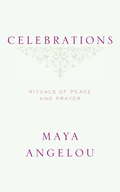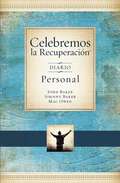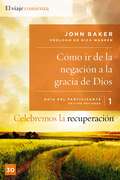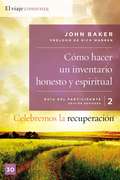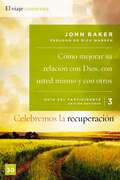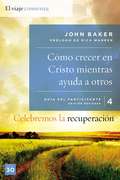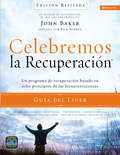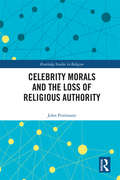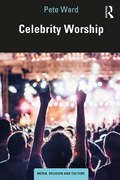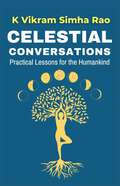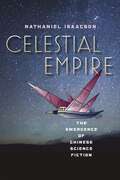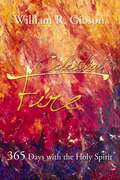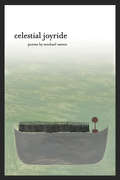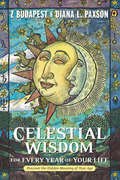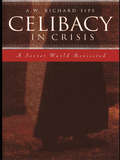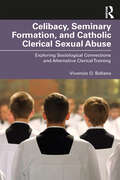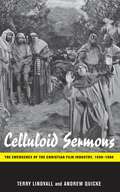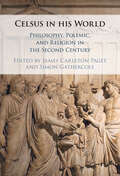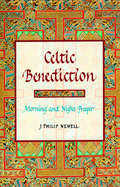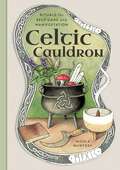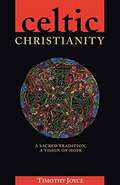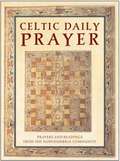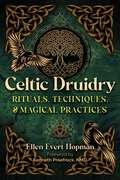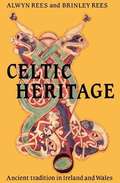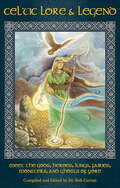- Table View
- List View
Celebrations: Rituals of Peace and Prayer
by Maya AngelouGrace, dignity, and eloquence have long been hallmarks of Maya Angelou’s poetry. Her measured verses have stirred our souls, energized our minds, and healed our hearts. Whether offering hope in the darkest of nights or expressing sincere joy at the extraordinariness of the everyday, Maya Angelou has served as our common voice. Celebrations is a collection of timely and timeless poems that are an integral part of the global fabric. Several works have become nearly as iconic as Angelou herself: the inspiring “On the Pulse of Morning,” read at President William Jefferson Clinton’s 1993 inauguration; the heartening “Amazing Peace,” presented at the 2005 lighting of the National Christmas Tree at the White House; “A Brave and Startling Truth,” which marked the fiftieth anniversary of the United Nations; and “Mother,” which beautifully honors the first woman in our lives. Angelou writes of celebrations public and private, a bar mitzvah wish to her nephew, a birthday greeting to Oprah Winfrey, and a memorial tribute to the late Luther Vandross and Barry White.More than a writer, Angelou is a chronicler of history, an advocate for peace, and a champion for the planet, as well as a patriot, a mentor, and a friend. To be shared and cherished, the wisdom and poetry of Maya Angelou proves there is always cause for celebration.
Celebremos la Recuperación Devocionales: 365 Devocionales (Celebrate Recovery)
by John Baker Johnny BakerCelebrate Recovery Devotional es 365 breves lecturas originales, diseñadas como un refuerzo y estímulo diario para millones de personas que están en el camino hacia la recuperación. Celebrate Recovery no es solo un programa, sino un medio para lograr un cambio de vida duradero, y la clave para la recuperación es mantener vivos los ocho Principios de Vida centrados en Cristo. A medida que los lectores se involucran con las devociones, descubrirán los principios más firmemente consolidados en sus pensamientos y acciones diarias, y encontrarán apoyo continuo y esperanza para el camino por recorrer. Cada devoción poderosa es un recordatorio de la bondad, la gracia y la redención de Dios, y será una inspiración para todos los que luchan con las heridas, los hábitos y los complejos de antaño. Comience donde está. Comienza hoy The Celebrate Recovery Daily Devotional es 365 breves lecturas originales, diseñadas como un refuerzo y estímulo diario para millones de personas que están en el camino hacia la recuperación. Celebrate Recovery no es solo un programa, sino un medio para lograr un cambio de vida duradero, y la clave para la recuperación es mantener vivos los ocho Principios de Vida centrados en Cristo. A medida que los lectores se involucran con las devociones, descubrirán los principios más firmemente consolidados en sus pensamientos y acciones diarias, y encontrarán apoyo continuo y esperanza para el camino por recorrer. Cada devoción poderosa es un recordatorio de la bondad, la gracia y la redención de Dios, y será una inspiración para todos los que luchan con las heridas, los hábitos y los complejos de antaño. Comience donde está. Comienza hoy
Celebremos la recuperación Guía 1: Un programa de recuperación basado en ocho principios de las bienaventuranzas (Celebremos la Recuperación)
by Rick Warren John BakerUn programa de recuperación basado en ocho principios de las bienaventuranzas: 1. Reconozco que no soy Dios. Admito que no tengo poder para controlar mi tendencia a hacer lo malo y que mi vida es inmanejable. “Dichosos los pobres en espíritu, porque el reino de los cielos les pertenece.” (Mateo 5:3) 2. En una forma sincera creo que Dios existe, que le intereso y que Él tiene el poder para ayudarme en mi recuperación. “Dichosos los que lloran, porque serán consolados.” (Mateo 5:4) 3. Conscientemente decido comprometer toda mi vida y voluntad al cuidado y control de Cristo. “Dichosos los humildes, porque recibirán la tierra como herencia.” (Mateo 5:5) 4. Una apertura para un autoexamen y confesión de mis faltas a Dios y a alguien en quien confío. “Dichosos los de corazón limpio, porque ellos verán a Dios.” (Mateo 5:8) 5. Para que Dios pueda hacer los cambios en mi vida, me someto voluntariamente a Él y con humildad le pido que remueva mis defectos de carácter. “Dichosos los que tienen hambre y sed de justicia, porque serán saciados.” (Mateo 5:6) 6. Evalúo todas mis relaciones. Ofrezco perdón a aquellos queme han hecho daño y enmiendo los daños que he ocasionado a otros, excepto si cuando al hacerlo les dañara a ellos o a otros. “Dichosos los compasivos, porque serán tratados con compasión.” (Mateo 5:7) 7. Reservo un tiempo diario con Dios para una autoevaluación, lectura de la Biblia y oración con el fin de conocer a Dios y Su voluntad para mi vida y obtener el poder para seguirla. “Dichosos los que trabajan por la paz,porque serán llamados hijos de Dios.” (Mateo 5:9) 8. Al rendir mi vida a Dios para ser usada puedo llevar estas Buenas Nuevas a otros, tanto con mi ejemplo como con mis palabras. “Dichosos los perseguidos por causa de la justicia, porque el reino de los cielos les pertenece". (Mateo 5:10)
Celebremos la recuperación Guía 2: Un programa de recuperación basado en ocho principios de las bienaventuranzas (Celebremos la Recuperación)
by Rick Warren John BakerUn programa de recuperación basado en ocho principios de las bienaventuranzas: 1. Reconozco que no soy Dios. Admito que no tengo poder para controlar mi tendencia a hacer lo malo y que mi vida es inmanejable. “Dichosos los pobres en espíritu, porque el reino de los cielos les pertenece.” (Mateo 5:3) 2. En una forma sincera creo que Dios existe, que le intereso y que Él tiene el poder para ayudarme en mi recuperación. “Dichosos los que lloran, porque serán consolados.” (Mateo 5:4) 3. Conscientemente decido comprometer toda mi vida y voluntad al cuidado y control de Cristo. “Dichosos los humildes, porque recibirán la tierra como herencia.” (Mateo 5:5) 4. Una apertura para un autoexamen y confesión de mis faltas a Dios y a alguien en quien confío. “Dichosos los de corazón limpio, porque ellos verán a Dios.” (Mateo 5:8) 5. Para que Dios pueda hacer los cambios en mi vida, me someto voluntariamente a Él y con humildad le pido que remueva mis defectos de carácter. “Dichosos los que tienen hambre y sed de justicia, porque serán saciados.” (Mateo 5:6) 6. Evalúo todas mis relaciones. Ofrezco perdón a aquellos queme han hecho daño y enmiendo los daños que he ocasionado a otros, excepto si cuando al hacerlo les dañara a ellos o a otros. “Dichosos los compasivos, porque serán tratados con compasión.” (Mateo 5:7) 7. Reservo un tiempo diario con Dios para una autoevaluación, lectura de la Biblia y oración con el fin de conocer a Dios y Su voluntad para mi vida y obtener el poder para seguirla. “Dichosos los que trabajan por la paz,porque serán llamados hijos de Dios.” (Mateo 5:9) 8. Al rendir mi vida a Dios para ser usada puedo llevar estas Buenas Nuevas a otros, tanto con mi ejemplo como con mis palabras. “Dichosos los perseguidos por causa de la justicia, porque el reino de los cielos les pertenece". (Mateo 5:10)
Celebremos la recuperación Guía 3: Un programa de recuperación basado en ocho principios de las bienaventuranzas (Celebremos la Recuperación)
by Rick Warren John BakerUn programa de recuperación basado en ocho principios de las bienaventuranzas: 1. Reconozco que no soy Dios. Admito que no tengo poder para controlar mi tendencia a hacer lo malo y que mi vida es inmanejable. “Dichosos los pobres en espíritu, porque el reino de los cielos les pertenece.” (Mateo 5:3) 2. En una forma sincera creo que Dios existe, que le intereso y que Él tiene el poder para ayudarme en mi recuperación. “Dichosos los que lloran, porque serán consolados.” (Mateo 5:4) 3. Conscientemente decido comprometer toda mi vida y voluntad al cuidado y control de Cristo. “Dichosos los humildes, porque recibirán la tierra como herencia.” (Mateo 5:5) 4. Una apertura para un autoexamen y confesión de mis faltas a Dios y a alguien en quien confío. “Dichosos los de corazón limpio, porque ellos verán a Dios.” (Mateo 5:8) 5. Para que Dios pueda hacer los cambios en mi vida, me someto voluntariamente a Él y con humildad le pido que remueva mis defectos de carácter. “Dichosos los que tienen hambre y sed de justicia, porque serán saciados.” (Mateo 5:6) 6. Evalúo todas mis relaciones. Ofrezco perdón a aquellos queme han hecho daño y enmiendo los daños que he ocasionado a otros, excepto si cuando al hacerlo les dañara a ellos o a otros. “Dichosos los compasivos, porque serán tratados con compasión.” (Mateo 5:7) 7. Reservo un tiempo diario con Dios para una autoevaluación, lectura de la Biblia y oración con el fin de conocer a Dios y Su voluntad para mi vida y obtener el poder para seguirla. “Dichosos los que trabajan por la paz,porque serán llamados hijos de Dios.” (Mateo 5:9) 8. Al rendir mi vida a Dios para ser usada puedo llevar estas Buenas Nuevas a otros, tanto con mi ejemplo como con mis palabras. “Dichosos los perseguidos por causa de la justicia, porque el reino de los cielos les pertenece". (Mateo 5:10)
Celebremos la recuperación Guía 4: Un programa de recuperación basado en ocho principios de las bienaventuranzas (Celebremos la Recuperación)
by Rick Warren John BakerUn programa de recuperación basado en ocho principios de las bienaventuranzas: 1. Reconozco que no soy Dios. Admito que no tengo poder para controlar mi tendencia a hacer lo malo y que mi vida es inmanejable. “Dichosos los pobres en espíritu, porque el reino de los cielos les pertenece.” (Mateo 5:3) 2. En una forma sincera creo que Dios existe, que le intereso y que Él tiene el poder para ayudarme en mi recuperación. “Dichosos los que lloran, porque serán consolados.” (Mateo 5:4) 3. Conscientemente decido comprometer toda mi vida y voluntad al cuidado y control de Cristo. “Dichosos los humildes, porque recibirán la tierra como herencia.” (Mateo 5:5) 4. Una apertura para un autoexamen y confesión de mis faltas a Dios y a alguien en quien confío. “Dichosos los de corazón limpio, porque ellos verán a Dios.” (Mateo 5:8) 5. Para que Dios pueda hacer los cambios en mi vida, me someto voluntariamente a Él y con humildad le pido que remueva mis defectos de carácter. “Dichosos los que tienen hambre y sed de justicia, porque serán saciados.” (Mateo 5:6) 6. Evalúo todas mis relaciones. Ofrezco perdón a aquellos queme han hecho daño y enmiendo los daños que he ocasionado a otros, excepto si cuando al hacerlo les dañara a ellos o a otros. “Dichosos los compasivos, porque serán tratados con compasión.” (Mateo 5:7) 7. Reservo un tiempo diario con Dios para una autoevaluación, lectura de la Biblia y oración con el fin de conocer a Dios y Su voluntad para mi vida y obtener el poder para seguirla. “Dichosos los que trabajan por la paz,porque serán llamados hijos de Dios.” (Mateo 5:9) 8. Al rendir mi vida a Dios para ser usada puedo llevar estas Buenas Nuevas a otros, tanto con mi ejemplo como con mis palabras. “Dichosos los perseguidos por causa de la justicia, porque el reino de los cielos les pertenece". (Mateo 5:10)
Celebremos la recuperación Guía del líder - Edición Revisada: Un programa de recuperación basado en ocho principios de las bienaventurazas
by Rick Warren John Baker¡Felicidades por tomar una de las decisiones más gratificantes de su vida! Su decisión de realizar el programa «Celebremos la Recuperación» le proporciona la inigualable experiencia de ver a personas quebrantadas ser transformadas por el poder de Cristo. Como líder, está a punto de marcar una diferencia de la manera más directa posible: ayudando a otros a descubrir esperanza y cambio que ellos creían que estaba por encima de su alcance. Además, su propia vida nunca será la misma a medida que vea que su inversión de tiempo y de interés la recupera de maneras que nunca imaginó. Esta guía del líder le da todo lo que necesita para facilitar las transformadoras lecciones de «Celebremos la Recuperación». Hemos hecho nuestro mejor esfuerzo para simplificar su tarea. El formato claro y fácil de seguir minimiza su tiempo de preparación, y prácticamente le dirige en cada reunión. Además de la capacidad de seguir instrucciones básicas, un corazón dispuesto es lo único que usted necesita para conducir exitosamente este programa probado y transformador.
Celebrity Morals and the Loss of Religious Authority (Routledge Studies in Religion)
by John PortmannThis book examines American popular culture to demonstrate that celebrities have superseded religious figures as moral authorities. As trust in religious institutions has waned over recent decades, the once frivolous entertainment fringe has become the moral center. Young people and voters increasingly take cues from actors and athletes. The book begins by offering a definition of celebrity and showing that the profile of celebrities has changed dramatically, particularly since the 1960s. They can now chart their own careers, manage their own personal lives and weigh in on pressing moral issues in a manner that hasn’t always been the case. This can be to the good, it is argued, for some counterintuitive reasons. Very few stars pretend to be moral exemplars, unlike the frequently hypocritical elites they have replaced. Others, however, are seemingly poorly qualified to speak on complex moral issues. In the end, it also turns out that who tells us how to feel about any moral issue counts at least as much as what they tell us. This is a fresh look at the impact of celebrity culture on contemporary morality and religious authority. As such, it will be of great use to academics working in religious studies and ethics, as well as popular culture and media studies.
Celebrity Worship (Media, Religion and Culture)
by Pete WardCelebrity Worship provides an introduction to the fascinating study of celebrity culture and religion. The book argues for celebrity as a foundational component for any consideration of the relationship between religion, media and culture. Celebrity worship is seen as a vibrant and interactive discourse of the sacred self in contemporary society. Topics discussed include: Celebrity culture. Celebrity worship and project of the self as the new sacred. Social media and the democratisation of celebrity. Reactions to celebrity death. Celebrities as theologians of the self. Christian celebrity. Using contemporary case studies, such as lifestyle television, the religious vision of Oprah Winfrey and the death of David Bowie, this book is a gripping read for those with an interest in celebrity culture, cultural studies, media studies, religion in the media and the role of religion in society.
Celestial Conversations: Practical Lessons for the Humankind
by K Vikram Simha Rao"Celestial Conversations: Practical Lessons for the Humankind" by K Vikram Simha Rao is a unique exploration of philosophical and spiritual teachings through a series of fifteen fictitious panel discussions. Moderated by celestial beings, these panels feature historical and spiritual figures such as King Prahlad, Jesus Christ, Lord Buddha, Mahatma Gandhi, and others. They engage in deep dialogues on themes pertinent to human life, such as the nature of the body, mind, and soul, the importance of ethical living, and the pursuit of spiritual enlightenment. The book aims to provide practical guidance by translating ancient wisdom into actionable insights for contemporary issues, emphasizing the balance between material and spiritual well-being. Through these imaginative conversations, Rao seeks to reinforce the values of Sanatana Dharma and encourage readers to embark on a journey of self-discovery and spiritual growth.
Celestial Empire: The Emergence of Chinese Science Fiction (Early Classics Of Science Fiction Ser.)
by Nathaniel IsaacsonHow colonialism profoundly influenced the emergence of Chinese science fiction Challenging assumptions about science fiction's Western origins, Nathaniel Isaacson traces the development of the genre in China, from the late Qing Dynasty through the New Culture Movement. Through careful examination of a wide range of visual and print media—including historical accounts of the institutionalization of science, pictorial representations of technological innovations, and a number of novels and short stories—Isaacson makes a case for understanding Chinese science fiction as a product of colonial modernity. By situating the genre's emergence in the transnational traffic of ideas and material culture engendered by the presence of colonial powers in China's economic and political centers, Celestial Empires explores the relationship between science fiction and Orientalist discourse. In doing so it offers an innovative approach to the study of both vernacular writing in twentieth-century China and science fiction in a global context.
Celestial Fire: 365 Days with the Holy Spirit
by William R. GibsonDo you enjoy a good mystery? When you see something amazing happen do you ever wish you could look past the surface event to the real reason for its occurrence? Does it ever bother you when the reason something is a success, or a failure is kept from you?What fun is it to never get in on the mystery of how to have peace and joy? To never be told how to supercharge your life? To never understand or experience the behind-the-scenes action.Celestial Fire: 365 Days with the Spirit answers those questions. The book explains many mysteries, answers a multitude of questions, and shows how to live an empowered life.Gibson does not shy away from the hot explosive texts over which scholars and theologians have wrangled since the beginning. Rather, he opens these Bible verses with care and explains their meaning for believers today. In so doing, many mysteries will be resolved, and the truth will be revealed. The reader will experience the following benefits:• An enriching time of connectedness with God each day. • Knowledge of every Biblical reference concerning the Spirit • A deeper walk with the Lord• An energized, faith building Christian life• A map on how to access the Father’s presence.• Instruction on how to walk and worship in the Spirit• Teaching on how to bring heaven‘s atmosphere to earth‘s troublesThe cumulative effect of studying every Spirit reference from Genesis to Revelation is powerful. Each citation comes with a suggested Biblical reading, an explanation of the verse, and an application to daily life. A wide range of subjects—from the arts to the anointing—takes the reader to places they would not otherwise travel. These daily inspirations will increase a person’s knowledge and understanding of the Third Person of the Trinity and deepen their walk with Christ. This potent treatise will resonate with everyone serious about living a dynamic life transformed by heaven‘s fire.Not only will these inspirational insights energize but they will also impact one’s life. The Holy Spirit is still the rushing mighty wind and the fire from above causing wondrous things to happen in our world today. Discover the real power behind Christianity and the explosive growth of the Church around the world. The Third Person of the Godhead so long neglected is now celebrated—each devotion features a particular aspect of the person and work of the Spirit.This devotional goes far beyond developing the reader’s spiritual life—it examines, exegetes, and interprets 365 Biblical references and applies them to today. These informative bursts of inspiration are indispensable for small group Bible studies, ministry preparation, and even sermon material. Celestial Fire: 365 Days with the Holy Spirit is a must read for anyone interested in learning more about the Holy Spirit. The work is a virtual course in Pneumatology. Get ready to embark on a yearlong life-changing journey and enjoy an enriching time with God every day. Now, scroll to the top of this page, buy the book, and start immediately.
Celestial Joyride
by Michael WatersIn these poems of taut clarity, craft, and texture, Michael Waters continues his bold exploration of sensual pleasure and moral transgression as means of affirming spiritual faith. Just as a joyride suggests recklessness and exhilaration, so Celestial Joyride is an energized journey marked by spiritual recklessness in the face of perpetual mortality. Compelling, musical narratives offer rich meaning and vivid consequence.Michael Waters's poetry books include BOA Editions titles Gospel Night, Darling Vulgarity, finalist for the Los Angeles Times Book Prize; and Parthenopi, finalist for the Paterson Poetry Prize. He teaches at Monmouth University and in the Drew University MFA Program.
Celestial Wisdom for Every Year of Your Life
by Diana L. Paxson Zsuzsanna Emese BudapestDrawing from their combined expertise in spirituality, psychology, astrology, history, and mythology, internationally acclaimed teacher and witch Z. Budapest and mythographer and novelist Diana Paxson have created a guide to the general trends one can expect in each year of a person's life. Organized first by decade, then specific year within each decade, Celestial Wisdom: For Every Year of Your Life gives new insight and helpful prognostications to the total sweep of the human lifespan, from birth and before to 90 and beyond. Each year has a description exploring the issues, challenges, and joys specific to it. Stories of people experiencing life at that age are woven throughout, offering insight and perspective on the dynamics at play. Each age ends with a ritual, blessing, and suggestion for how to meaningfully celebrate it, especially at birthday time. For example, are you about to turn 29? Fasten your seatbelt, Saturn is about to return to where it was when you were born and you are in for a change. The changes could come in the areas of job, relationship, or where you live. The combined cosmic knowledge of Budapest and Paxson says, "Take a deep breath - change is afoot; see how that energy of change has manifested itself in the lives of others." For your 29th birthday, they suggest, counteract that "I'm almost thirty and I haven't?" syndrome by celebrating the things you have done. Tape a big piece of butcher paper to the wall. List each year since age twenty and next to it write down what you were doing. Get some colored pencils and have a party. Your friends might just contribute and surprise you. Two pagan powerhouses reveal the wisdom of the ages in an astrological and psychological guide to each year of a woman's life. Budapest and Paxson's combined book sales top two million. Light-hearted and playful, yet grounded in years of multidisciplinary study, this book reveals surprising new insights to the possibilities of each year of our lives.
Celibacy in Crisis: A Secret World Revisited
by A.W. Richard SipeIn the midst of the worst crisis the Catholic Church has seen in almost 500 years, this book challenges Catholic authorities to renew, rethink, or reform the long-standing institution of celibacy.
Celibacy, Seminary Formation, and Catholic Clerical Sexual Abuse: Exploring Sociological Connections and Alternative Clerical Training (Routledge Studies in the Sociology of Religion)
by Vivencio O. BallanoDoes the current celibate, semi-monastic, and all-male seminary formation contribute to the persistence of clerical sexual abuse in the Roman Catholic Church?Applying sociological theories on socialization, total institutions, and social resistance as the primary conceptual framework, and drawing on secondary literature, media reports, the author’s experience, interviews, and Church documents, this book argues that the Catholic Church’s institution of the celibate seminary formation as the only mode of clerical training for Catholic priests has resulted in negative unintended consequences to human formation such as the suspension of normal human socialization in society, psychosexual immaturity, and weak social control against clerical sexual abuse. The author thus contends that celibate training, while suitable for those who do live in religious or monastic communities, is inappropriate for those who are obliged to live alone and work in parishes. As such, an alternative model for diocesan clerical formation is advanced.A fresh look at the aptness – and effects – of celibate formation for diocesan clergy, this volume is the first to relate the persistence of Catholic clerical sexual abuse to celibate seminary formation, exploring the structural links between the two using sociological arguments and proposing an apprenticeship-based model of formation, which has numerous advantages as a form of clerical training. It will therefore appeal to scholars and students of religion, sociology, and theology, as well as those involved with seminary formation.
Celluloid Sermons: The Emergence of the Christian Film Industry, 1930-1986
by Terry Lindvall Andrew QuickeChristian filmmaking, done outside of the corporate Hollywood industry and produced for Christian churches, affected a significant audience of church people. Protestant denominations and individuals believed that they could preach and teach more effectively through the mass medium of film. Although suspicion toward the film industry marked many conservatives during the early 1930s, many Christian leaders came to believe in the power of technology to convert or to morally instruct people. Thus the growth of a Christian film industry was an extension of the Protestant tradition of preaching, with the films becoming celluloid sermons. Celluloid Sermons is the first historical study of this phenomenon. Terry Lindvall and Andrew Quicke highlight key characters, studios, and influential films of the movement from 1930 to 1986—such as the Billy Graham Association, with its major WorldWide Pictures productions of films like The Hiding Place, Ken Curtis’ Gateway Films, the apocalyptic “end-time” films by Mark IV (e.g. Thief in the Night), and the instructional video-films of Dobson’s Focus on the Family--assessing the extent to which the church’s commitment to filmmaking accelerated its missions and demonstrating that its filmic endeavors had the unintended consequence of contributing to the secularization of liberal denominations.
Celsus in his World: Philosophy, Polemic and Religion in the Second Century
by Simon Gathercole James Carleton PagetCelsus penned the earliest known detailed attack upon Christianity. While his identity is disputed and his anti-Christian treatise, entitled the True Word, has been exclusively transmitted through the hands of the great Christian scholar Origen, he remains an intriguing figure. In this interdisciplinary volume, which brings together ancient philosophers, specialists in Greek literature, and historians of early Christianity and of ancient Judaism, Celsus is situated within the cultural, philosophical, religious and political world from which he emerged. While his work is ostensibly an attack upon Christianity, it is also the defence of a world in which Celsus passionately believed. It is the unique contribution of this volume to give voice to the many dimensions of that world in a way that will engage a variety of scholars interested in late antiquity and the histories of Christianity, Judaism and Greek thought.
Celtic Benediction: Morning and Night Prayer
by John Philip NewellThis lavishly illustrated daily prayer book draws on the great spiritual insights and wisdom of the Celtic church, offering prayers and Scripture readings for every morning and evening of the week. Each day Celtic Benediction invites readers to meditate on a different aspect of the creation story from Genesis. On Sunday the theme is light. In the morning, the prayers and readings lead us to seek the light of the life of God in all his creatures. At night, we meditate on the light that no darkness can overcome as we bring the world and its needs to God. And so on through each day of the week: water, the fruitful earth, the animal world, humanity, playful rest, and all that God has made draw us into intimate prayer. Related Scripture readings are also given for each day of the year, making this a book to use constantly. Illustrated throughout with colored panels from the Lindisfarne Gospels, Celtic Benediction offers contemporary Christians a unique devotional experience to treasure for a lifetime.
Celtic Cauldron
by Nicola McIntoshUsing the cauldron for ritual, creation and manifestation.The cauldron has always been a symbol of magick and creation and played an integral role in Celtic myth and history. Aptly known as the vessel of manifestation or creation, what we put into it creates something new.Delve into the history of the cauldron and learn the many ways it can be used to help focus your intent to manifest change in your life. This easy-to-follow book contains practical, modern-day recipes and rituals that can become a part of your everyday life, no matter where you live and what culture you come from. Whether you want to create more flow and joy in your space or manifest love and abundance, the book will guide you through every step of the process, using readily available ingredients or substituting herbs and plants that you wish to incorporate to make your ritual more personal.Bringing together her knowledge of Celtic shamanism, crystals and working with plant spirit medicines, Nicola McIntosh teaches you how to create herbal brews, essences, incense, spell bottles, medicine pouches, meals, anointing salves and much more in a variety of cauldrons. The cauldron is symbolic of transformation and Nicola's fresh, modern-day approach successfully brings the old ways into the new.
Celtic Christianity: A Sacred Tradition, A Vision Of Hope
by Timothy J. JoyceThis fascinating book introduces the mysterious and extraordinary world of Celtic Christianity. Timothy Joyce, a Benedictine monk of Irish descent, evokes the distinctive spirituality that drew on pre-Christian beliefs and culture. He shows how this style of Christianity changed, was subordinated, and gave way to the larger Roman church, and yet how elements endured. Finally, he explores what Celtic spirituality has to offer today to the church as well as spiritual seekers. Celtic spirituality is holistic -- a joyful, mystically-inclined spirituality that affirms the goodness of creation, urges respect for women's gifts, and finds expression in poetry, myth, and song. Joyce recounts the heroic stories of such saints as Patrick, Bridget, Columcille, and Columba. But he goes beyond other treatments to explore how this tradition was gradually subsumed by a more rigid style of "Irish Catholicism, " and he reflects on the centuries of suffering that have left an indelible mark on the Irish consciousness and spirit. Yet ultimately Joyce shows how the recovery of this ancient tradition of Christianity might rejuvenate the church and contribute to spiritual renewal today.
Celtic Daily Prayer: Prayers and Readings from the Northumbria Community
by The Northumbria CommunityThe Ancient Paths of Northumbria in northeastern England have been trod by generations of men and women who loved God and followed Jesus, bringing faith, hope, and love to vast numbers of people. Today, the Northumbria Community remains a living expression of this monastic, contemplative stream of the faith, and the perennial need to make that faith relevant to the world. Celtic Daily Prayer is the fruit of the spiritual life of a remarkable community. Its liturgies, prayers, and meditations are drawn from a deep well of spiritual experience that transcends fashion, culture, and denomination. Blending prayer and praise and building upon the ancient wisdom of traditional Celtic Christianity, this prayer book is extraordinarily fresh. At the heart of the life of the Northumbria Community, as well as this book, lies the Daily Office -- morning, noon, and evening prayers and a monthly cycle of meditations for individual or communal use each day. With words drawn from sources such as St. Patrick's Breastplate, Teresa's Bookmark, Columba's Blessing, and the Psalms, this cycle of daily prayers reflects the essential rhythms of life. With liturgies for communion and other special occasions as well as daffy readings, this prayer book contains two complete years of scripture readings and a calendar of saints' days and festivals. The Jewish tradition of family Shabbat, adapted with prayers from the Celtic tradition, also finds its place in this book. A section on rites of passage suggests prayers and rituals for the pivotal times of life: birth, rebirth, marriage, midlife, and bereavement, as well as blessings and graces for all occasions. This traditionally grounded yet surprisingly modem prayer book will enrich the spiritual life of readers for years to come.
Celtic Druidry: Rituals, Techniques, and Magical Practices
by Ellen Evert Hopman• Explains how to make and use the essential tools of a Celtic Druid and how to create Druid rituals for seasonal rites, blessings, and other sacred observances • Details Druidic magical techniques and divination practices, as well as plant spells for performing magic with herbs • Explores the Gods and Goddesses of the Celtic pantheon, Druidic cosmology, and the Druidic festivals that occur throughout the year In this authentic handbook for the Celtic Druid path, Ellen Evert Hopman shares lessons, rituals, and magical techniques drawn from the ancient wisdom teachings of the Celts as well as a modern Druid Order created by the leading minds of 20th-century Celtic Reconstructionism. Hopman begins by exploring what we know about the original ancient Druids, citing Druid-contemporary sources such as Caesar and Diodorus Siculus as well as transcriptions of Druid oral teachings. She explains the basic tools and clothing of a Celtic Druid, including instructions for making the essential tools of the craft, such a Crane Bag, the Serpent Staff, and the Apple Branch, the tool used to open a Druid rite. She explores meditation techniques based on ancient texts and discusses the Gods and Goddesses of the Celtic pantheon, Druidic cosmology, and the Druidic festivals that occur throughout the turning of the year. She shares hymns to the Moon and the Sun as well as invocations for connecting with specific deities and elements. She also outlines the basics of Druidic liturgy, enabling you to create Druid rituals for seasonal rites, baby blessings, house blessings, hand-fastings, funerals, and other sacred observances. Detailing Druidic magical techniques, Hopman shares charms and incantations for abundance, protection, and healing as well as plant spells for performing magic with herbs. She discusses many forms of Druidic divination, including interpreting omens and divining with the ancient Irish alphabet, Ogham. Exploring the special connection between humans and Nature, a core component of Druidic practice, the author explains how to bond with Nature and the sacred land as well as examining the connection between Druids and trees. Revealing how to become a modern Druid, this concise yet detailed guide presents everything you need to know to start your journey on the Druidic path.
Celtic Heritage: Ancient Tradition in Ireland and Wales
by Alwyn D. Rees Brinley ReesThis book is a discussion of Irish and Welsh myths. A religious tradition consists of a ritual and an art as well as a mythology, and each of these components is intelligible in terms of the others. Symbols, whether they are myths or ceremonies or objects, reveal their full significance only within a particular tradition; one must be part and parcel of that tradition to experience fully the power and illumination of the myth. Although the full meaning can never be fathomed, we believe that a comparative study of the stories, combined with some acquaintance with the myths, rituals, and doctrines of other lands and other ages, may help us to obtain glimpses of the tradition of which the stories, even in their original form, were but one expression.
Celtic Lore & Legend: Meet the Gods, Heroes, Kings, Fairies, Monsters, and Ghosts of Yore
by Dr Bob CurranAn Irish folklorist presents a collection of little-known ancient myths, fireside tales, and modern fictions to celebrate the Celtic art of storytelling.Steeped in the oral traditions of rural Northern Ireland, Bob Curran celebrates the lore and legends of his people. This volume includes some of the oldest tales to be passed down across the centuries, as well as newer stories inspired by these Celtic roots.Celtic Lore & Legend includes tales of the heroes and gods from the Great Myth Cycles as well as stories of witches, ghosts, and fairies. This is the first anthology to seek out and record the traditions from many parts of the Western Celtic world—Ireland, Cornwall, Scotland, Wales, and Brittany—from as early as the seventeenth century.
